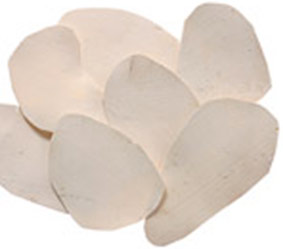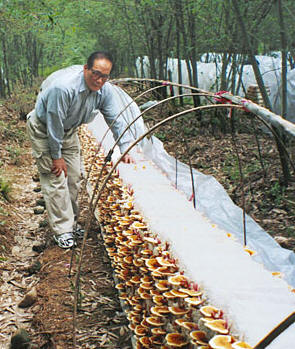
Lateinischer Name: Poria cocos, Wolfiporia extensa, Wolfiporia cocos
Andere Namen: Tuckahoe, Indian bread, hoelen (englisch), Poria cocos (deutsch), Pachyme (französisch)
Aktive Inhaltsstoffe: Polysaccharide, Ergosterol, Fungisterin, Cholin, Phospholipide, Natrium, Kalium, Calcium, Magnesium, Eisen, Mangan, Zink, Kupfer.
Dieser Pilz gleicht einer kleinen Kokosnuss, daher sein Name. Der Poria-Pilz kommt im Osten von China und Australien und im Südosten der USA vor. Er wächst unter Kiefern wie eine Kartoffel unter der Erde, und große Exemplare können ein Gewicht von ca. 10 kg erreichen. Früher haben die Indianer in Zeiten der Nahrungsknappheit aus dem Poria-Pilz eine Art Brot gebacken.
In der chinesischen Medizin wird der Stiel des Pilzes als Betäubungsmittel und Diuretikum verwendet. Anwendungsgebiete sind unter anderem Husten, Schwellungen und Gelbsucht (Ref. 1, 2).
Anwendung von Poria cocos in der TCM (Traditionelle Chinesische Medizin)
| Name in der TCM | Fuling (chinesisch), bukuryo, matsuhodo (japanisch) |
| Geschmack | süß, geschmacklos |
| Wirkung | Herz, Milz, Niere |
| Anwendung | Neutral |
Wissenschaftliche Studien
| Gebiet | Studie |
| Immunsystem | 5,11,12,13,16 |
| Antiviral | |
| Anti-Tumor / Krebs | 5,6,7,8,10,12,15 |
| Blutzuckerspiegel | |
| Blutdruck | |
| Cholesterin | |
| Entzündungshemmer | 3,4 |
| Antikoagulantien | |
| Diabetes | |
| Leberschutz | |
| Allergie | |
| Lungenkrankheiten | |
| Hautprobleme | 14 |
| Ausdauer |
Wissenschaftliche Forschung zu Poria cocos – 16 verfügbaren Referenzen
- Bensky D, Clavey S, Stogër E, Gamble A. Ling Zhi. Chinese Herbal Medicine: Materia Medica. 3rd ed. Seattle: Eastland Press; 2004:933-935.
- Miyasita, S. - A historical study of Chinese drugs for the treatment of jaundice, 1976, American Journal of Chinese Medicine, 4:239.
- Yasukawa K, Kaminaga T, Kitanaka S, Tai T, Nunoura Y, Natori S, Takido M. - 3 beta-p-hydroxybenzoyldehydrotumulosic acid from Poria cocos, and its anti-inflammatory effect. Phytochemistry. 1998 Aug;48(8):1357-60. PMID: 9720314
- Fuchs SM, Heinemann C, Schliemann-Willers S, Härtl H, Fluhr JW, Elsner P. Assessment of anti-inflammatory activity of Poria cocos in sodium lauryl sulphate-induced irritant contact dermatitis. Skin Res Technol. 2006 Nov;12(4):223-7. PMID: 17026651
- Wang Y, Yu Y, Mao J. Carboxymethylated beta-glucan derived from Poria cocos with biological activities. J Agric Food Chem. 2009 Nov 25;57(22):10913-5. PMID: 19877636
- Zhang L, Chen L, Xu X, Zeng F, Cheung PC. Effect of molecular mass on antitumor activity of heteropolysaccharide from Poria cocos. Biosci Biotechnol Biochem. 2005 Mar;69(3):631-4. PMID: 15784995
- Jin Y, Zhang L, Zhang M, Chen L, Cheung PC, Oi VE, Lin Y. Antitumor activities of heteropolysaccharides of Poria cocos mycelia from different strains and culture media. Carbohydr Res. 2003 Jul 4;338(14):1517-21. PMID: 12829397
- Lin Y, Zhang L, Chen L, Jin Y, Zeng F, Jin J, Wan B, Cheung PC. Molecular mass and antitumor activities of sulfated derivatives of alpha-glucan from Poria cocos mycelia. Int J Biol Macromol. 2004 Oct;34(5):289-94.PMID: 15556230
- Luo L, Nong Wang J, Kong LD, Jiang QG, Tan RX. Antidepressant effects of Banxia Houpu decoction, a traditional Chinese medicinal empirical formula. J Ethnopharmacol. 2000 Nov;73(1-2):277-81. PMID: 11025166
- Zhang M, Chiu LC, Cheung PC, Ooi VE. Growth-inhibitory effects of a beta-glucan from the mycelium of Poria cocos on human breast carcinoma MCF-7 cells: cell-cycle arrest and apoptosis induction. Oncol Rep. 2006 Mar;15(3):637-43. PMID: 16465424
- Lin Z, Zhu D, Yan Y, Yu B, Wang Q, Shen P, Ruan K. An Antioxidant Phytotherapy to Rescue Neuronal Oxidative Stress. Evid Based Complement Alternat Med. 2008 Aug 7. [Epub ahead of print] PMID: 18955358
- Wang Y, Zhang L, Li Y, Hou X, Zeng F. Correlation of structure to antitumor activities of five derivatives of a beta-glucan from Poria cocos sclerotium. Carbohydr Res. 2004 Oct 20;339(15):2567-74. PMID: 15476718
- Wu SJ, Ng LT, Lin CC. Antioxidant activities of some common ingredients of traditional chinese medicine, Angelica sinensis, Lycium barbarum and Poria cocos. Phytother Res. 2004 Dec;18(12):1008-12. PMID: 15742346
- Fuchs SM, Heinemann C, Schliemann-Willers S, Härtl H, Fluhr JW, Elsner P. Assessment of anti-inflammatory activity of Poria cocos in sodium lauryl sulphate-induced irritant contact dermatitis. Skin Res Technol. 2006 Nov;12(4):223-7. PMID: 17026651
- Kang HM, Lee SK, Shin DS, Lee MY, Han DC, Baek NI, Son KH, Kwon BM. Dehydrotrametenolic acid selectively inhibits the growth of H-ras transformed rat2 cells and induces apoptosis through caspase-3 pathway. Life Sci. 2006 Jan 2;78(6):607-13. Epub 2005 Aug 19. PMID: 16112686
- Zheng Y, Yang XW. Poriacosones A and B: two new lanostane triterpenoids from Poria cocos. J Asian Nat Prod Res. 2008 Jul-Aug;10(7-8):645-51. PMID: 18636376




